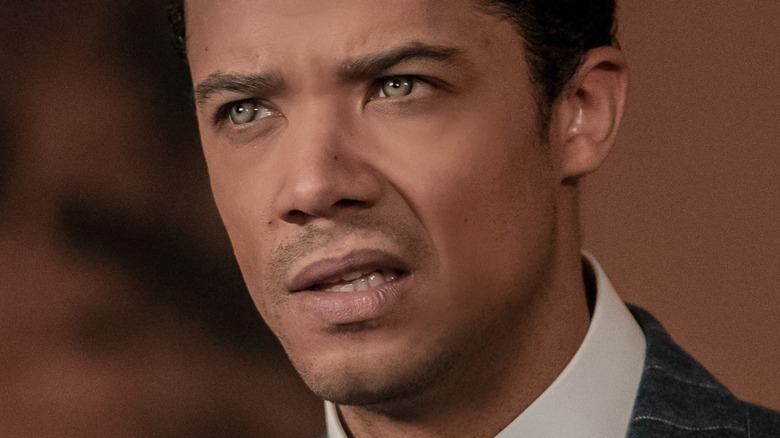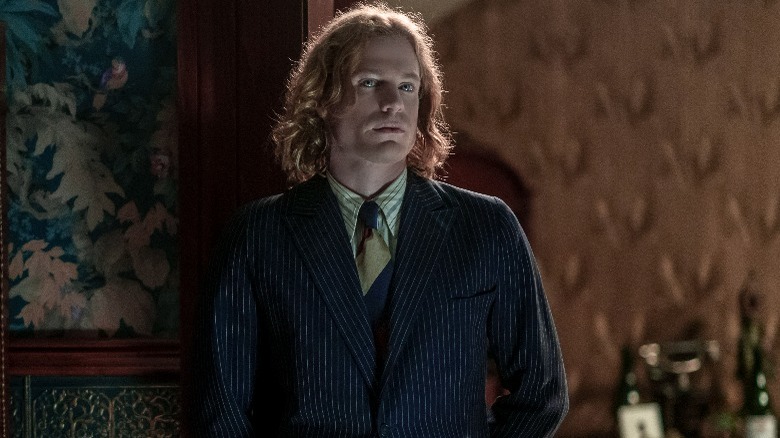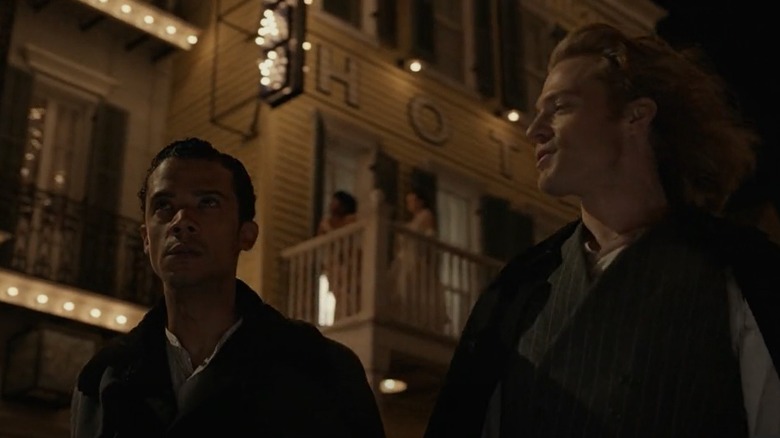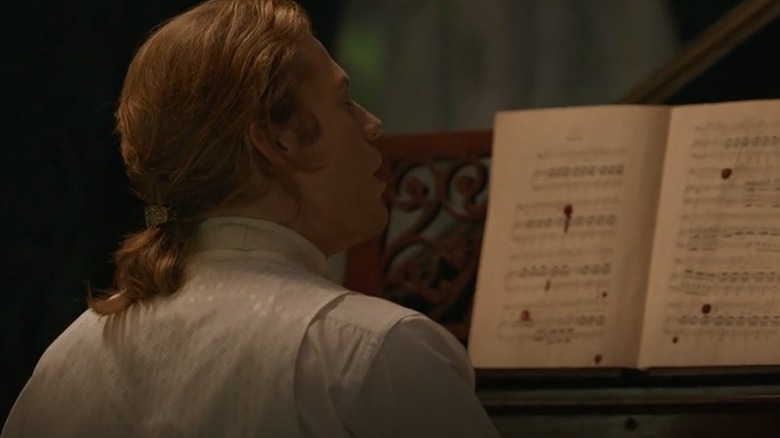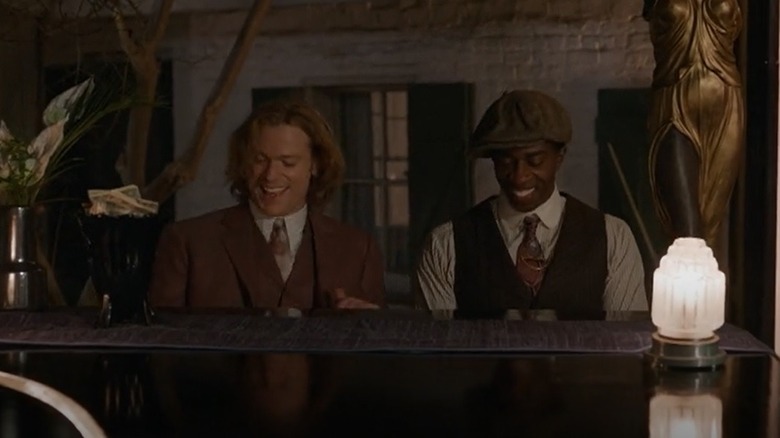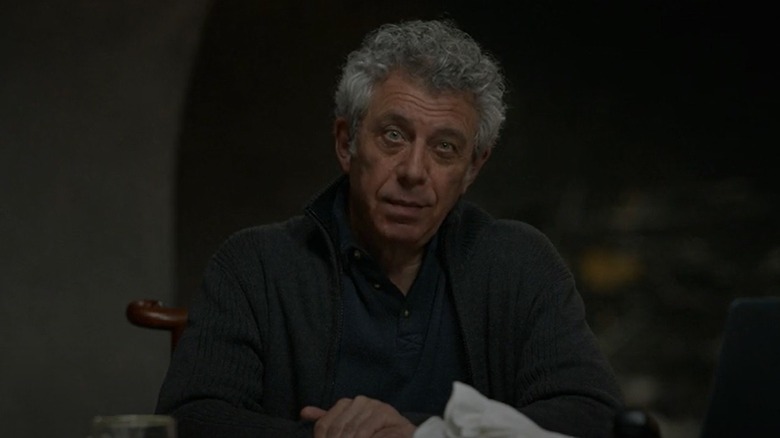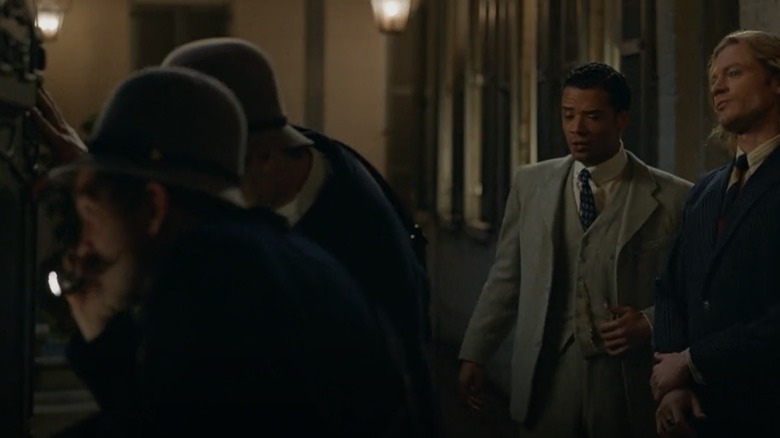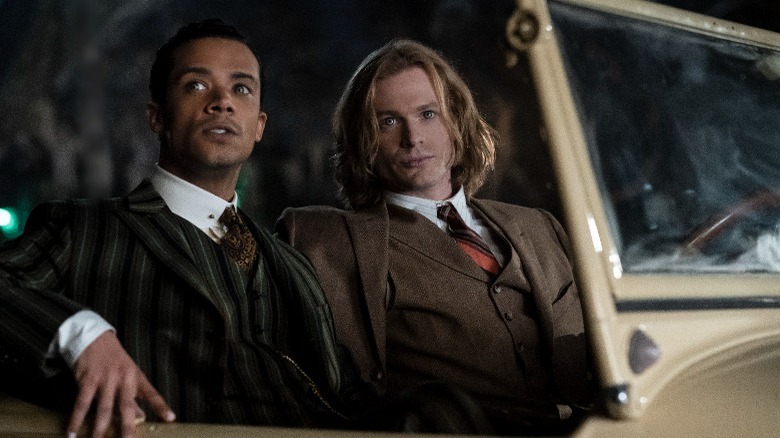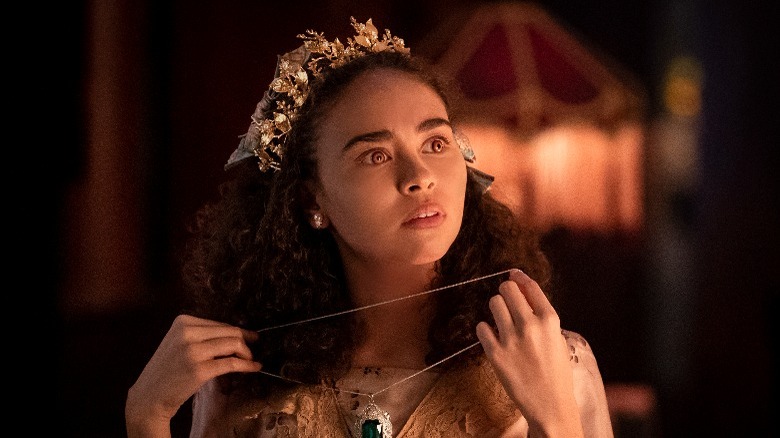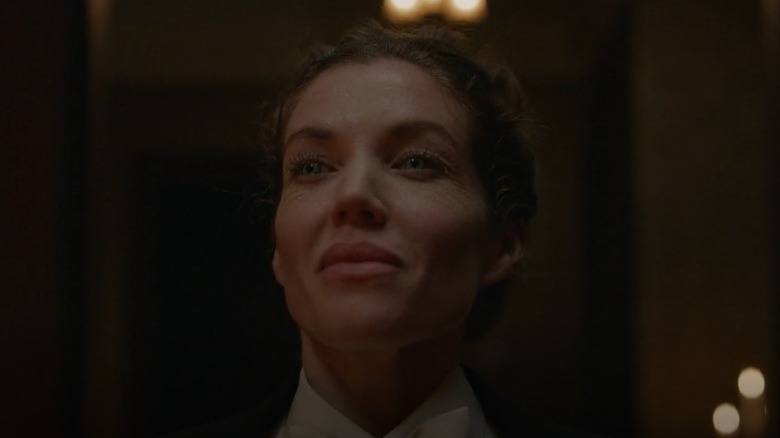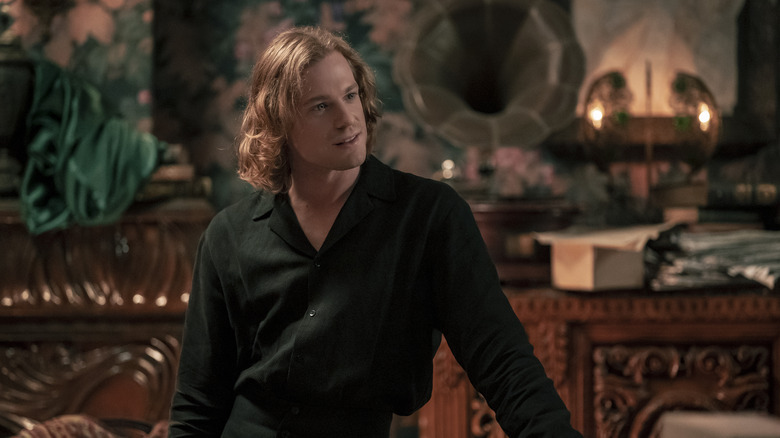Small Details You Missed In Interview With The Vampire
Two of Anne Rice's favorite bloodsuckers, Lestat de Lioncourt and Louis de Pointe du Lac, have returned to the live-action realm in the form of AMC's "Interview with the Vampire" television show. While the series hits the main beats of Rice's 1976 novel, there are a few creative liberties taken, as expected with any adaptation. At its core, though, the focus remains the same, and it is still a "beautifully written rant about an ex," as actor Jacob Anderson, who plays Louis on the show, told the New York Post. It's a story about how Louis' life changes when he meets the vampire Lestat and they discover all the pros and cons of eternal life.
Even though Season 1 of the show only consists of seven episodes, each one is loaded with questions about love, buckets of blood, and unraveling mysteries. With so many stories and subplots being explored, there are also many details that might get lost in the first viewing of the show. They may seem inconsequential at first, but they are essential to note since they help to close several story loops and reveal even more information about the characters and their behaviors on screen.
So let's break down all the small details fans may have missed from Season 1 of "Interview with the Vampire" and see what their importance is to the narrative and the audience's understanding of the overall story.
The details of Lestat's history with the church
In most vampire lore, the bloodsuckers don't have a good relationship with the church. They are showcased as the Devil's creations, which instantly puts them at odds with any Christian iconography. In fact, holy water and crosses are often portrayed as the best tools to keep vamps away. In "Interview with the Vampire," though, the rules are a little different. Lestat, for example, can walk into a church without bursting into flames, so that's already a plus for his team. He still possesses a strained relationship with Jesus Christ, though this comes from his pre-vampire days, as he reveals in the first episode, "In Throes of Increasing Wonder..."
At one point, Louis' brother Paul asks Lestat, "Are you one with Christ, Mr. de Lioncourt?" While Louis is aghast at his brother's inappropriate behavior and line of questioning, Lestat answers the question, revealing more about the man he was before he became a vampire.
Lestat explains how he planned to be a priest and went to a monastery to learn under the guidance of monks. He learned both the testaments and different religious texts. The story takes a darker turn, though, as Lestat discloses how his father didn't approve of his choices and employed the help of his brothers to get him away from the monastery. As punishment, Lestat was locked away, beaten, and starved until he began to question if a merciful God actually exists.
The difference between the blood of the living and dead
Being a vampire is risky business. Since their main food supply is blood, they need to sink their teeth into their victims to drain them. However, this creates two problems for them. First, they need to lure victims into their homes or dark corners to feed. Second, they need to dispose of the bodies without anyone noticing. So, wouldn't it be far easier if they simply drank the blood of corpses? After all, that would solve most of their issues since there would be a constant supply available at the morgue or graveyards. Unfortunately, this is a no-go for vampires, as Lestat explains to Louis in Episode 2, "...After the Phantoms of Your Former Self."
After Louis turns and tries to drink the spilled blood of the deceased priest, Lestat stops him, saying, "We live off the blood of the living. Lap up the blood of the deceased, and it'll suck you right down into death, along with your victim." It's kind of the equivalent of consuming dairy after the expiry date — it's a bad idea that doesn't end well for anybody.
Lestat really loves his music
Music is the food for the soul. It has the ability to influence mood and turn around any terrible day in a rhythmic heartbeat. As such, people feel incredibly passionate about it, and arguments about what constitutes good or bad music are rife in society. Heck, tell a metalhead that Metallica changed the history of heavy metal more than Slayer and a restraining order might be necessary to keep an angry, pitchfork-carrying mob away from your doors. Turns out that Lestat is equally passionate about music, having been around to see many famous composers and musicians perform their classic hits in person.
In "...After the Phantoms of Your Former Self," Lestat takes Louis to the opera to watch a production of "Don Pasquale." While the soprano enchants Lestat with her ability, he becomes annoyed by the tenor, whom he believes is bringing down the overall quality of the show with his lack of skill and by singing the wrong notes.
His punishment for this is as cruel as anything Terence Fletcher from "Whiplash" dreams up as he lures the man to his home and proceeds to ridicule him for not living up to lofty standards. Then he drains him of his blood as vengeance for his crimes against music. It's evident Lestat loves his music, but he loses his mind when other people's ears or tastes aren't as refined as his. He almost makes online trolls look like rational human beings in comparison.
Lestat wrote Wolverine Blues
"Wolverine Blues" is an iconic jazz number composed by Jelly Roll Morton (per Shazam). It has become a jazz standard for musicians who enter the genre, who often learn to play it while dissecting the nuances of the composition and its melody. Jazz is also an important element of the "Interview with the Vampire" television show as it is a genre that was created in New Orleans and features predominantly in Louis' Azalea Hall, especially in the earlier episodes of the series.
Discussing the past with Daniel in the present, Louis reveals how a young Morton played piano at the Azalea. However, Lestat heckled him during his performance, trying to prove a point to Louis as well as everyone else around them. Morton asked Lestat to step up to the piano if he thought he could do better then. Lestat did so, and he and Morton put on a rip-roaring performance that had the crowd on their feet. Louis suggests to Daniel that Lestat is responsible for developing the melody of "Wolverine Blues."
Daniel, though, questions the authenticity of this claim, pointing out that Louis had fed him different information in their prior recordings. The only person who knows if this is true or not is Louis. However, his view of Lestat is definitively skewed because of their past relationship, so use discretion when believing this claim.
Louis has kept close tabs on Daniel
The character of Daniel Molloy is much different in the "Interview with the Vampire" television series. While in the book and 1994 film he is portrayed as a young reporter, here he is a more seasoned interviewer who is near the end of his life after a battle with Parkinson's. More importantly, this isn't his first rodeo with Louis, as they met years earlier to tell the vampire's story. Their previous encounter didn't end on a good note, as Louis attacked Daniel after he thought the reporter was disrespecting him. Now, Louis wants to give Daniel a second stab at the story.
While it's evident Louis knows about Daniel's illness — since he is a vampire and can sniff out something like that — and what has happened in his career since their last encounter, he also harbors other knowledge. At one point, Daniel points out that Louis has been keeping a close eye on him since their first meeting, something that isn't denied by the bloodsucker. It's clear the two developed a friendship in the past, and there are traces of it in the current era.
Louis has shown to be someone who experiences emotions and regrets more than other vampires, so keeping tabs on Daniel might be his way of seeing if his old pal is okay. By showing up now, it might be his final attempt at giving his "friend" the big story before he passes away.
The vampires don't clean the incinerator very well
When most people are hungry, they head to the fridge to see what they have to snack on. Maybe there's a jar of pickles, or perhaps even the chow mein leftovers from a night or two ago. However, vampires have it a little tougher than the rest of us. Since Louis and Lestat can't store their food in Tupperware, they need to feast on their meals fresh. However, there are a lot of risks involved in enjoying their crimson smoothies. One of the most difficult issues is the need to dispose of the bodies after their banquets. Louis and Lestat do this through the use of an incinerator that burns the evidence.
Despite Lestat being picky about life's luxuries and only wanting the finest, it doesn't appear like the vamp family cleans their "grill" too often, judging by the events of Episode 5, "A Vile Hunger for Your Hammering Heart." After Claudia goes on a rampage, the police start to conduct random searches in homes. The officers take a glance inside the incinerator, though they somehow fail to see the bones sitting right in front of them.
Now, it's fair that Claudia was getting up to mischief and not disposing of her meals accordingly, but the incinerator looked dirtier than a 1970s crime film. Lestat and Louis would have fed recently, so why didn't they clean the incinerator afterward? Maybe grab a brush and scrub away some of those remains!
Lestat and Louis argue in French
Don't be fooled by the seduction and sensuality of their romance because Lestat and Louis have a toxic relationship that needs a warning label. Akin to the Joker and Harley Quinn, Lestat isn't averse to using gaslighting and other dastardly techniques to keep Louis under his spell. As shown throughout Season 1 of "Interview with the Vampire," Louis tends to fall for Lestat's lies every single time and can't escape him. He is bewitched by his beauty and guile, often not challenging or calling out his vampire companion's unfortunate behavior. It's only when Claudia enters the fray and clashes with Lestat that Louis suddenly finds his voice to argue.
While Lestat and Louis thought introducing a child into their relationship would bring them closer, it has the opposite effect. In Episode 4, "...The Ruthless Pursuit of Blood with All a Child's Demanding," Claudia narrates the arguments that the two lovers have with each other and how she knew it was about to set off when they switched languages. In her journal, she writes about how when they start speaking French to each other, it signifies they are upset about something and are prepared to exchange harsh words.
It's an interesting contrast considering how French is often described as "the language of love," but it's the language in which Lestat and Louis communicate their anger at each other best.
Claudia's kill list
The evolution of Claudia is a central focus of the "Interview with the Vampire" television show. Since she is turned when she is a 14-year-old girl, she stays stuck in a teenager's body even as her mind, emotions, and desires develop. At times, she struggles to find a balance, as Louis tries to help her to see a different, more civilized way to be a vampire while Lestat encourages her to embrace her inner monster and indulge in life's decadence. One event that sends Claudia tumbling into an emotional freefall, though, is after she accidentally drains Charlie — her first love. What makes it even worse is how Lestat forces her to burn Charlie's body and to watch as it's incinerated.
In Episode 5, "A Vile Hunger for Your Hammering Heart," Daniel reads through the vampire diaries in the present day. He discovers Claudia's diary, where she lists various descriptions of people. It's established this is her kill list, where she jots down all the people she has feasted on. It's fairly savage and dehumanizing since these victims are reduced to nothing more than what they are wearing and their distinctive features. They aren't named or treated as living creatures; instead, this is effectively a menu with details about which meal entails. Lestat must have been proud to read this.
Lestat's other vampire lover
Lestat tells Louis that being a vampire is a very lonely life, which is why he wants them to be together and experience eternal life as partners. Louis knows that Lestat has other lovers he visits in the dead of the night and accepts this is a part of their relationship. What he doesn't bank on is how Lestat is a sneaky bloodsucker who isn't telling the entire truth. He has turned another person into a vampire and probably spews the same lies to her too. Claudia reveals the other vampire to be Antoinette, who plays a major role in the events of the season finale, "The Thing Lay Still."
What probably stings the most about this betrayal is how Louis plays a part in introducing Lestat and Antoinette. Before developing a relationship with the vampires, Antoinette is a blues singer who makes her way to New Orleans and finds work at the Azalea Hall, which is owned by Louis. Lestat is impressed by Antoinette's voice, which is significant considering how intense and judgemental he is about music, soon becoming drawn to her. While Louis knows Lestat and Antoinette have a relationship, it's only revealed later that Lestat gave her the gift of eternal life as he did to Louis. In the end, though, her loyalty to Lestat becomes her downfall, as she is burned to a crisp after trying to put a stop to Louis and Claudia's plan to annihilate their creator.
Lestat has a morbid sense of humor
Look, Lestat is an alluring individual. He knows how to utilize his wily vampiric charm to draw in unsuspecting victims. Coupled with his intelligence and appreciation of the fine arts, he seems like the kind of person that anyone could have a conversation with — as long as they were equipped with a knight's armor that could repel his sharp teeth and vicious claws. However, he has another quality that doesn't receive as much screen time in the "Interview with the Vampire" television show — a wicked sense of humor. He may show sass and sarcasm when necessary, but he provides a comedic moment of morbid proportions that would have Wednesday Addams laughing out loud.
In Episode 6, "Like Angels Put in Hell by God," Claudia tries to escape on a train out of town. However, her journey to freedom is interrupted by Lestat, who finds her before she gets too far. His arrival on the train is gloriously showy, as he busts open a door wearing the train conductor's hat and holding a man's severed head. Demonstrating how he must have learned the skill of ventriloquism from the originators, he puts on a performance with the decapitated head that would put Jeff Dunham to shame.
It's a macabre piece of humor, but the viewer can't help but chuckle as Lestat puts on a voice and has a conversation with the head that feels like his own personal puppet.
